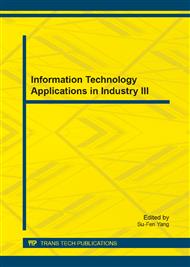[1]
Yang Baojun. City Planning Review and Prospect of 30 years[J]. Urban Planning Forum, 2010(01): pp.14-23. In Chiese.
Google Scholar
[2]
Wolfgang Loibl, Tanja Toetzer. Modeling growth and densification processes in suburban regions—simulation of landscape transition with spatial agents[J]. Environmental Modelling & Software, 2003. 18(6): pp.553-563.
DOI: 10.1016/s1364-8152(03)00030-6
Google Scholar
[3]
Arend Ligtenberg, Monica Wachowicz, Arnold K Bregt, Adrie Beulens, Dirk L Kettenis. A design and application of a multi-agent system for simulation of multi-actor spatial planning[J]. Journal of Environmental Management, 2004. 72(1): pp.43-55.
DOI: 10.1016/j.jenvman.2004.02.007
Google Scholar
[4]
Bo Lin, Huifeng Xue, Ling Cai. MAS Modeling of Urban Spatial Evolution[J]. MICROCOMPUTER APPLICATIONS, 2007. 28(10): pp.1092-1097. In Chiese.
Google Scholar
[5]
Long Ying, Shen Zhenjiang, Mao Qizhi. Retrieving Individual Attributes from Aggregate Dataset for Urban Micro-simulation: A Preliminary Exploration[J]. ACTA GEOGRAPHICA SINICA, 2011. 66(3). In Chiese.
Google Scholar
[6]
A. Ligtenberg,R. J. A. van Lammeren,A. K. Bregt, A. J. M. Beulens. Validation of an agent-based model for spatial planning: A role-playing approach[J]. Computers Environment and Urban Systems, 2010. 34(5): pp.424-434.
DOI: 10.1016/j.compenvurbsys.2010.04.005
Google Scholar
[7]
Xu Bo, Guo Zhumei. Study On the Disaster Shelter Function of Urban Green Space and Its Design[J]. CHINESE LANDSCAPE ARCHITECTURE, 2008. 24(12): p.4. In Chiese.
Google Scholar
[8]
Nigel Gilbert, Steven Bankes. Platforms and methods for agent-based modeling[J]. Proceedings of the National Academy of Sciences, 2002. 99(suppl 3): pp.7197-7198.
DOI: 10.1073/pnas.072079499
Google Scholar
[9]
Alexander Serenko, Brian Detlor. Agent toolkits: A general overview of the market and an assessment of instructor satisfaction with utilizing toolkits in the classroom[J]. (2002).
Google Scholar
[10]
Andrew Rixon, Magnus Moglia, Stewart Burn. Bottom-up approaches to building agent-based models: Discussing the need for a platform[C]. in Proceedings of the Joint Conference on Multiagent Modeling for Environmental Management. 2005: Citeseer.
Google Scholar
[11]
Steven F Railsback, Steven L Lytinen, Stephen K Jackson. Agent-based simulation platforms: Review and development recommendations[J]. Simulation, 2006. 82(9): pp.609-623.
DOI: 10.1177/0037549706073695
Google Scholar
[12]
Charles M Macal, Michael J North. Agent-based modeling and simulation[C]. in Winter Simulation Conference. 2009: Winter Simulation Conference.
DOI: 10.1109/wsc.2009.5429318
Google Scholar
[13]
Christian JE Castle, Andrew T Crooks. Principles and concepts of agent-based modelling for developing geospatial simulations[J]. (2006).
Google Scholar
[14]
Repast S workshop. ReLogo Getting Started Guide[DB/OL]. 2013; Available from: http: /repast. sourceforge. net/docs/ReLogoGettingStarted. pdf.
Google Scholar


